On Thursday, U.S. President Joe Biden essentially issued an ultimatum to Israeli Prime Minister Benjamin Netanyahu: either safeguard Gaza's civilian population and foreign aid workers, or Washington may withhold its support for Israel's military campaign against Hamas militants.
The message came following an Israeli attack that killed seven World Central Kitchen (WCK) aid workers and incited international outrage, and it came months after the United States demanded that Israel alter its military tactics that have killed tens of thousands of Palestinians.
Israel concedes that the strike was erroneous.
The White House remained silent about the precise actions it expected Netanyahu to take, or what it would do in the event that he did not. However, experts claimed that the implicit threat was to reduce American support at the UN or to halt arms transfers to Israel.
In reference to Biden's statement from last month that he and Netanyahu were headed for such a turning point, analyst Steven Cook of the Council on Foreign Relations think tank said, "This is as close to a 'come to Jesus' moment as you can get."
Veteran American diplomat Dennis Ross, who is currently employed by the Washington Institute for Near East Policy, stated: "The president is essentially saying that if these humanitarian needs are not met, I will be forced to condition (military) assistance."
Up for reelection in November, Biden has found it difficult to strike a balance between the risk of upsetting mostly pro-Israel independent voters and the pressure to rein in Netanyahu from progressive Democrats appalled at the number of Palestinian civilian deaths. So far, he has refused to impose restrictions on the transfer of weapons.
Biden urged Israel "to announce and implement a series of specific, concrete, and measurable steps to address civilian harm, humanitarian suffering, and the safety of aid workers," according to a White House statement describing their request.
The White House said in a statement, "He made clear that U.S. policy with respect to Gaza will be determined by our assessment of Israel's immediate action on these steps."
More direct was U.S. Secretary of State Antony Blinken. "Look, I'll just say this: if we don't see the changes that we need to see, there will be changes in our policy."
The Israeli government opened the Ashdod port and the Erez crossing into northern Gaza on Thursday night, just hours after the call, and increased aid deliveries from Jordan, among other measures to increase aid flows to Gaza. It was unclear if the actions would be sufficient to meet American demands.
The horrific Israeli attack on the employees of celebrity chef Jose Andres' WCK charity organization on Monday marked a turning point for Biden, an avid supporter of Israel.
It happened at the same time that the Biden administration increased its pressure on Israel to think of alternatives to a ground offensive that was being threatened in the southern Gaza city of Rafah, which is the last reasonably safe haven for civilians in the coastal enclave.
Under the condition of anonymity, a person acquainted with the discussions said that the 30-minute conversation was occasionally heated, with Biden expressing his worries and Netanyahu justifying his strategy regarding Gaza.
According to a senior White House official, Blinken, National Security Advisor Jake Sullivan, and Vice President Kamala Harris were all present during the "very direct, very straightforward" conversation.
The official stated, "We need a comprehensive plan on them doing a much better job here," when asked what the US expected. They cannot be murdering civilians and humanitarian aid workers."
Biden may have finally reached his limit, despite the fact that he has long avoided reducing US support for Israel.



























